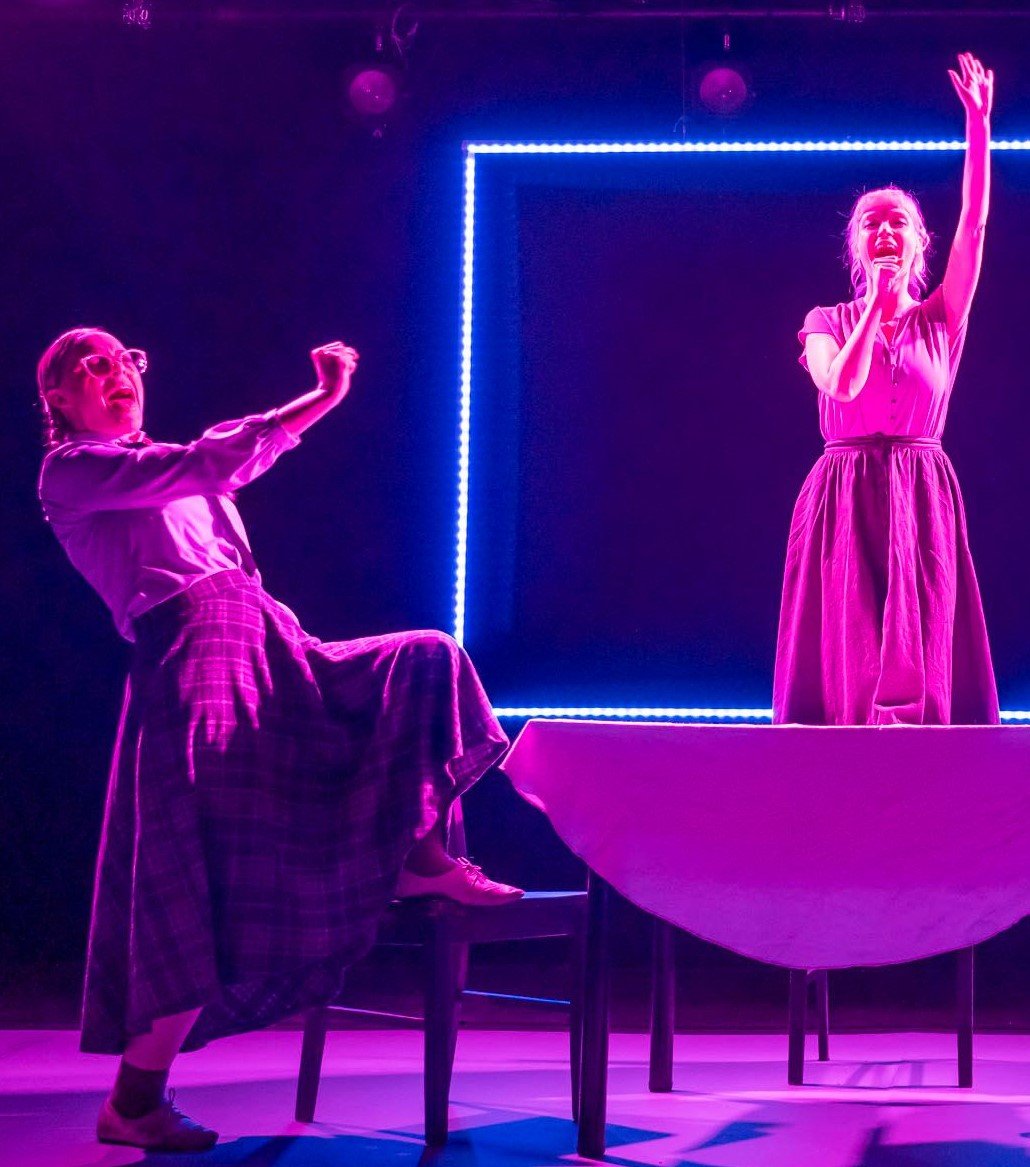From left: MaryKathryn Kopp, Kaitlin Paige Longoria, and Hallie Griffin share their hopes and dreams in H*tler’s Tasters. Photograph by Hunter Canning.
Much about Adolf Hitler was incongruous. Infatuated with his own greatness and that of the “Fatherland,” he pontificated about Aryan superiority, order, and sacrifice, yet his life was chaotic, fueled by anger and drug-induced delusions; he was obsessive and paranoid. In H*tler’s Tasters, playwright Michelle Kholos Brooks has brilliantly adapted the true story of 15 women who were employed to taste the paranoid leader’s food. It’s a timely drama with dark humor and music.
Uniformly dressed, with outstretched arms that resemble a hesitant Sieg heil, three thoroughly brainwashed fräuleins await the vegetarian haute cuisine that may, at any moment, kill them. In director Sarah Norris’s production, the trio take selfies on their phones. The anachronisms extend to dialogue from contemporary realities that threaten democracy: “Jews cannot replace us,” echoing the white supremacist rant in Charlottesville, Va., and “Black singers matter” rather than “Black Lives Matter.” The spontaneity with which the fräuleins mindlessly rattle off these mantras of hate and intolerance is mind-boggling, as is the mantras’ shelf life.
“There is much that is unsettling and foreboding in the play, despite the periodically comic dialogue and the upbeat, contemporary overlay.”
Their mood swings go from giddy, when they discuss romance, to fearful, during the hour that may be their last, to jubilant, when they realize they have survived. They dance, frenzied, to pop music, tear off beige jumpers and navy blouses, until they’re down to white, swastika-bearing tank tops and dark shorts (Ashleigh Poteat did the costumes). They resemble super-Aryan dolls safe in a cocoon, except for occasional gunshots that are heard outside their top security lair. The acting may seem exaggerated at time but given the fräuleins’ automaton-like movement and the way they largely spout rabid Nazi ideology, it makes sense.
Although these girls’ credence in the propaganda they have been fed is nearly total, pockets of doubt emerge, particularly with Anna, who feels sadness at the loss of her deported friend’s company and in a case of misplaced trust. There is a softness that transforms her as she tells these tales.
Griffin (left) and Longoria in a celebratory dance. Photograph by Burdette Parks.
There are also “darker” secrets to the fräuleins’ Nazified lives. Anna (Kaitlin Paige Longoria) speaks nostalgically about playing with children of a deported family and compares their goblets with the tasters’ gold cups. Hilda (MaryKathryn Kopp), horrified at Anna’s association with the family, chides her. As the staunchest Nazi of the group, Hilda has cultivated an air of superiority that stems from her father’s status as an officer. They may be frightened not to goose-step, but even more frightening for an audience is their empty-headedness.
Shortly after Anna also confides to the others that she has been raped by a soldier, she leaves the group and is likely killed. Was she not “pure” enough? Do the walls have ears (or bugs), or has some jealous “patriot” snitched on her? Ironically, all three maidens are severely flawed. Pent-up anger, sexual frustrations, and fear among them result in physical fights.
Hilda and Liesel (Hallie Griffin), whose perfectly parted blond schoolgirl braids belie her interest in boys and sex, remain. They are soon joined by Margot (Hannah Mae Sturges), another post-pubescent girl with whom the girls take more selfies, swoon over male American movie idols Fred Astaire and Frank Sinatra. They fantasize romantically about Hitler. Liesel, thoroughly indoctrinated, adds, “I’m sure the führer wouldn’t force himself on me. I’m not Poland.” The irony and sublime humor in her words escapes them all, and they dance enthusiastically in their outfits. Unpredictably, Hilda reveals that her father may be a deserter. Ironically, she, too, exits the room, replaced by an anonymous, semi-robotic, führer-worshipping taster. As the room darkens for the final time, the three women again stand, arms outstretched, palms upright, as in supplication. As they await another meal, and an uncertain future, the eerie lighting by Christina Tang enhances a truly bizarre impression.
From left: Hannah Mae Sturges, Kopp, Griffin, and Longoria take a selfie. Photograph by Zach Griffin.
In retrospect, the cell phones and upbeat pop music are not incongruous; rather, they reflect that what happened then could happen now and is happening now in some places where the specter of fascism looms large, as do racism, antisemitism, xenophobia, and rejection of the “other.” Kholos Brooks underscores the point in a program note that states, “We dedicate this production to the people of Ukraine.”
There is much that is unsettling and foreboding in the play, despite the periodically comic dialogue and the upbeat, contemporary overlay. For the audience, the artistic complexity of the show fortunately leaves much room for interpretation and the relevance needs no explication. Let’s just say it all comes together and works well.
New Light Theater Project’s production of H*tler’s Tasters runs through May 21 at Theater Row (410 West 42nd St.). Evening performances are at 7 p.m. Thursdays and at 8 p.m. Fridays and Saturdays; matinees are 2 p.m. Saturdays and at 3 p.m. Sundays. For more information, call the box office at (212) 714-2442 or visit newlighttheaterproject.com.





